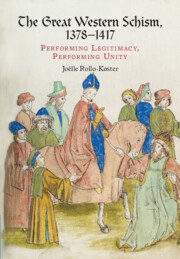‘… the book … makes a real contribution to analyses of the schism, and cannot be ignored. Moreover, its approach, arguments and use of evidence should stimulate broader reflection on how far ‘the Great Schism’ can justifiably be treated as a distinct and coherent segment of late medieval ecclesiastical history. It also raises important questions about the role of theory in historical analyses.’
Robert Swanson
Source: Sehepunkte
‘… Professor Rollo-Koster’s reanalysis of the great schism as a social drama not only represents a thought-provoking, behaviouralist corrective to political or institutional histories of the schism but could also give those studying many other medieval disputes pause for thought as to whether these conflicts, too, would benefit from being viewed in a more social or humanized light. … Professor Rollo-Koster appeals for historians not to neglect the schism. One could argue that their hesitancy is due in part to the high barriers to entry imposed by the sheer quantity and extent of primary and secondary literature drawn from many different countries and across disciplines which study of the schism involves and of which she so impressively evidences her mastery.’
Martin John Cable
Source: H-France Review
‘In short, Joëlle Rollo-Koster delivers a portrayal of the Great Western Schism based on a subtle understanding of primary sources and international research literature. She raises new questions about old themes, such as the bestowal practices of the Golden Rose, the reflection of the schism in literature and art, contemporary discussions about tyranny and regicide, and their consequences, as well as the significance of papal funeral ceremonies for liturgy and political theology. The author skillfully answers some of these questions methodically.’
Thomas Krzenck
Source: Zeitschrift der Savigny-Stiftung für Rechtsgeschichte
‘This is a tremendous contribution to the English-language investigation of the Schism and the fourteenth-century Catholic Church in France and Italy. Joëlle Rollo-Koster’s mastery of primary sources from this period and supporting historiography is impressive … scholars will find this study to be a monumental support in future studies of the Great Western Schism and investigations of the conflict’s effects on cultural performance.’
Jennifer Mara Desilva
Source: Renaissance and Reformation
‘The author moves with equal confidence in the delicate spheres of emotions, political intrigue, artistic subtleties, ethnology, performativity and complex sociological theories. The book offers a fundamental synthesis, and does so from a new, original and intelligent perspective. This stimulating and groundbreaking work thus shows the Great Western Schism as an ideal starting point for the historical consideration of the question of what constitutes a crisis.’
Benedicte Sere
Source: Rezensionen im Deutschen



